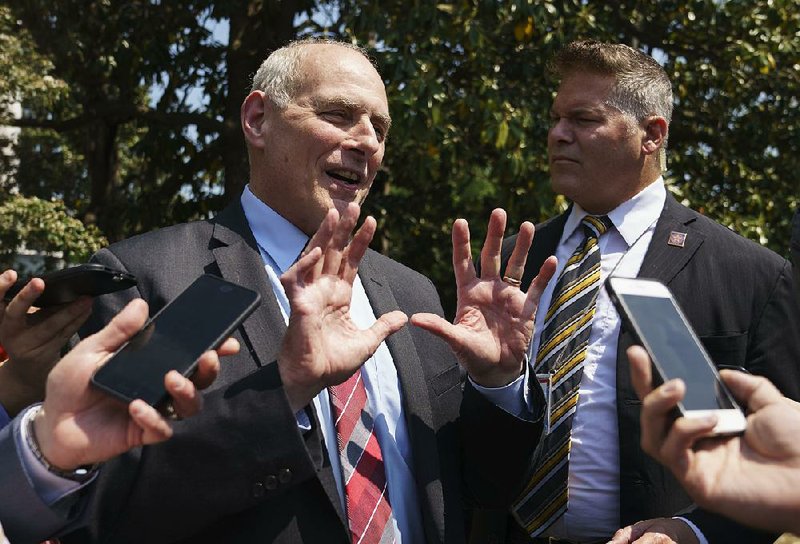WASHINGTON -- White House chief of staff John Kelly said President Donald Trump is "somewhat embarrassed" by the special counsel's investigation into Russian meddling in the 2016 election. But he later clarified that the president is "distracted."
Kelly told National Public Radio in an interview that aired Friday the probe "may not be a cloud" over the White House, but it gets discussed.
He told NPR: "When world leaders come in, it's kind of like, you know, Bibi Netanyahu is here ... who's under investigation himself, and it's like, you know, you walk in, and you know, the first couple of minutes of every conversation might revolve around that kind of thing."
Asked about the embarrassment comment, Kelly told a group of reporters later Friday that he "corrected that and said 'distracted.'" Asked if the president was distracted by the probe, Kelly said, "It's untrue, it's a witch hunt, right, and it distracts him -- not too much, but it's unfair."
Separately, the president's legal team indicated that Trump and his lawyers likely won't decide whether he will answer questions from Russia probe investigators until after his summit with North Korean leader Kim Jong Un next month.
Rudy Giuliani, the president's new attorney, said in an interview with The Associated Press on Friday that any preparation with Trump for a possible interview with federal investigators would likely be delayed until after the June 12 summit in Singapore because "I wouldn't want to take his concentration off something far, far more important."
Giuliani, who also suggested that special counsel Robert Mueller's team had indicated it would not attempt to indict Trump, said he had hoped to resolve the question of a possible interview by May 17, the one-year anniversary of Mueller's appointment, but that was no longer feasible.
"Several things delayed us, with the primary one being the whole situation with North Korea," Giuliani said. "The president has been very busy. It really would be pretty close to impossible to spend the amount of time on it we would need."
The president's lawyers have not decided whether it would be in Trump's best interest to sit for an interview. Giuliani warned that it could be a "perjury trap" and suggested that "lies told by others" could land the president in legal trouble, though he said that Trump himself would not close the door entirely on an interview.
"The president would probably like the resolution," the former New York City mayor said. "If we were convinced it would speed up the process, we may do it. If we believed they would go into it honestly and with an open mind, we would be inclined to do it. But right now, we're not there."
[PRESIDENT TRUMP: Timeline, appointments, executive orders + guide to actions in first year]
Mueller's investigation has operated largely in secrecy, with the public getting only glimpses into its operation through witnesses who are questioned or when indictments and guilty pleas are unsealed. But Giuliani suggested that a recent conversation with Mueller's team led him to believe that the special counsel, citing a Justice Department opinion, had ruled out the possibility of trying to indict a sitting president.
Mueller has floated the idea of issuing a grand jury subpoena for Trump to answer questions, former Trump attorney John Dowd has said, though it is unclear how serious prosecutors were about such a move. Even if Mueller's team decided to subpoena Trump as part of the investigation, the president could still fight it in court or refuse to answer questions by invoking his Fifth Amendment protection from self-incrimination.
Giuliani said Friday that if a subpoena were issued to get Trump to appear, the president's legal team would oppose it unless they could "reach agreement on the ground rules." He argued that Trump could invoke executive privilege, and the team would point to Justice Department opinions in fighting a subpoena and "on both law and the facts, we would have the strongest case you could imagine." He noted the handover of 1.2 million documents as evidence of cooperation.
A number of Trump allies, including Vice President Mike Pence this week, have stepped up calls for Mueller's investigation to wrap up, suggesting it was interfering in the president's ability to do the country's business. Mueller's team is investigating Russian interference in the 2016 election and possible coordination with Trump associates as well as whether the president obstructed justice. So far, the special counsel's office has charged 19 people -- including four Trump campaign advisers -- and three Russian companies.
Both Trump's former national security adviser, Michael Flynn, and his deputy campaign chairman, Rick Gates, have pleaded guilty and are now cooperating with the probe.
Trump's longtime personal attorney, Michael Cohen, had his office and home raided by federal agents and, this week, was revealed to have been selling his insight into Trump to corporations. Giuliani said the arrangement "looks bad" but insisted there was no crime.
Information for this article was contributed by Chad Day, Eric Tucker and staff members of The Associated Press.
A Section on 05/12/2018
